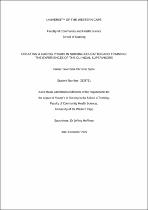| dc.contributor.advisor | Hoffman, Jeffrey | |
| dc.contributor.author | Syme, Beverdene Christine | |
| dc.date.accessioned | 2023-08-11T07:49:21Z | |
| dc.date.available | 2023-08-11T07:49:21Z | |
| dc.date.issued | 2023 | |
| dc.identifier.uri | http://hdl.handle.net/11394/10473 | |
| dc.description | Magister Curationis - MCur | en_US |
| dc.description.abstract | Background: The integration of theory, research, and practice as caring praxis was revealed in the everyday work and practice of caring within nursing. “Praxis is a coherent structure of the nurse's work that integrates guiding values, specific actions consistent within the social mission of the profession, knowledge construction, community awareness, and the realization that within a profession lies the process of bringing about some human good”, and that nursing as a “practice-based profession and its training requires the embedment of theoretical and clinical learning” along with national and provincial guidelines and treatment regimens to ensure that nurses are trained according to required standards of the nursing regulatory body in South Africa. It was therefore deemed relevant to examine the caring praxis in the nursing education and training of undergraduate nursing students.
Aim: The purpose of this study was to understand the experiences of clinical supervisors in creating a caring praxis in nursing education and training. The theoretical framework of this study is aimed to link the five comportments prescribed in the model of practical skills performance to clinical teaching to create a caring praxis in nursing education and training.
Design and method: This study employed a qualitative study method and a qualitative explorative contextual design to meet the two objectives of the study, which were: to explore and describe the experiences of the clinical supervisors doing clinical teaching in hospitals and clinics; and to identify the needs of the clinical supervisors to ensure a caring praxis in nursing education and training.
Ethical considerations: The proposal was submitted to the Humanities and Social Science Research Ethics Committee for approval. Permission was obtained from the Head of Department at the School of Nursing and the supervisor coordinator provided access to obtain information from potential participants. Informed consent was obtained from all participants, and they had the right to withdraw at any time should they wish to do so. The researcher aimed to guarantee the well-being of the participants and to minimize harm and discomfort. Anonymity was strictly maintained to protect the participants and ensure confidentiality.
Conclusion: Five main themes emerged from the analysis: during clinical supervision the clinical supervisors must ensure that they educate the nursing student to care for their patients holistically and to meet the patient’s needs regarding comfort and safety; the clinical supervisors integrate teaching and learning tools to breech the gap between theory and practice, integrating their experiences to add meaning to clinical teaching and learning; students’ participation and involvement during skills development allowed the clinical supervisors to assess and manage risk during patient engagement; during clinical teaching and learning the clinical supervisors has to ensure the skills are within the scope and guidelines of the clinical facilities; and the clinical supervisors takes on many roles to advocate and facilitate the caring praxis in nursing. | en_US |
| dc.language.iso | en | en_US |
| dc.publisher | University of the Western Cape | en_US |
| dc.subject | Undergraduate nursing programme | en_US |
| dc.subject | Caring praxis | en_US |
| dc.subject | Clinical accompaniment | en_US |
| dc.subject | Clinical supervision | en_US |
| dc.title | Creating a caring praxis in nursing education and training: The experiences of the clinical supervisors | en_US |
| dc.rights.holder | University of the Western Cape | en_US |

